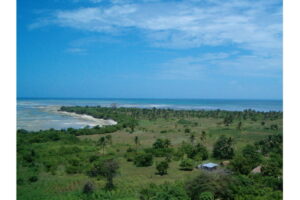
Tanzania, Dar es Salaam:
Zanzibar’s foreign earnings plummeted by 55 percent after price fluctuations and climate changes affected production and trading of cloves and seaweed which are key cash crops in the Island.
The Bank of Tanzania (BoT) data shows that the isles’ value of exported goods dropped to $19.4 million in the quarter ending September 2022, from $43.3 million earned in the corresponding quarter in 2021.
The amount of clove exports decreased by 62.3 percent to $14.94 million in September 2022 from $39.62 million, according to the BoT report.
The slowdown of earnings was a result of shrinking volume of the crop to 1,800 tonnes from 5,300 tonnes exported in 2021.
“The decline is related to the cyclical nature of the crop,” the central bank stated.
The clove price fluctuated to reach $10,963.3 per tonne in June this year before dropping to $8,184.2 per tonne in September this year.
As for the seaweed, the crop earnings had dropped by 11.7 percent by September this year to $1.09 million from $1.23 million the preceding year.
The crop volume during the period was also low by 32.1 percent as 2,100 tonnes were exported against 3,100 tonnes of 2021.
The impacts of ongoing unfavourable weather conditions are among the reasons that have affected seaweed production this year, according to the BoT.
From January to September 2022, Zanzibar produced 8,019 tonnes of seaweed, a slight decrease from 8,335.2 tonnes that were produced during the same period in 2021.
Speaking to The Citizen, public relations officer for Zanzibar State Trading Corporation (ZSTC), Ali Mohammed, said like any other agricultural produces, cloves and seaweed were vulnerable to weather changes in 2022, affecting their production levels.
“The crops yield was down compared to preceding recent years.
“There were also issues of market prices which are determined by the global markets and competitiveness from other producing countries like Madagascar,” he said.
Zanzibar’s large export destination for its spices is Asia to countries like India.
“In 2023, we plan to sustain quality and production levels so that we can boost our exports and remain competitive on the global level,” said Mr Mohammed.
On the other hand, Zanzibar’s receipts from the services sector had improved significantly as tourism activities recovered.
The BoT said during the review period, service receipts rose by 49.5 percent to $63.6 million compared with a similar quarter in 2021.
Tourist arrivals rose to 165,231 from 89,956 in the similar quarter in 2021 with tourists from Europe dominating at 64.3 percent, followed by Africa at 13.1 percent.
Share this news
This Year’s Most Read News Stories

Muslims in Pemba conduct special prayer against ZAA decision
ZANZIBAR: More than 200 Muslims in Vitongoji Village, South Pemba Region over the weekend conducted a special prayer to condemn the Zanzibar Airports Authority (ZAA) move to appoint DNATA as the sole ground handler in Terminal III of the International Airport of Zanzibar. Abeid Amani Karume.Continue Reading

Ground handling firms in Zanzibar start cutting jobs
ZAT and Transworld, companies providing ground handling services at Abeid Amani Karume International Airport, have to lay off workers to stay afloat.Continue Reading

How diplomatic intervention kept Air France, KLM in Zanzibar
It has, however, emerged, that the Netherland and France sought a diplomatic solution to a standoff at the Abeid Aman Karume International Airport, warning that it could disrupt Air France and KLM flights into Zanzibar, and later Dar es Salaam.Continue Reading










